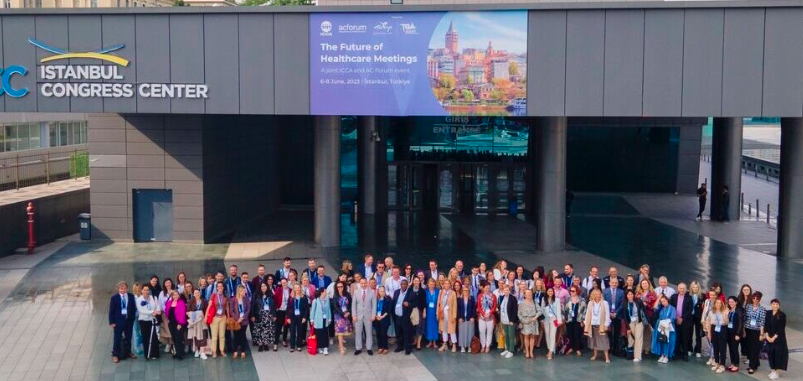Healthcare meetings hold a distinctive position as they unite healthcare professionals, industry experts, and stakeholders to explore the forefront of healthcare advancements. These meetings can vary in scale, ranging from large conferences and trade shows to intimate workshops and roundtable discussions. Covering topics such as medical research, clinical trials, healthcare policies, and patient care, these gatherings offer attendees a chance to learn from leading experts, exchange ideas, and establish connections within the industry. Given the intricacies of the healthcare sector, these meetings demand a high level of expertise and meticulous attention to detail, particularly regarding patient privacy and regulatory compliance.
Recognizing the significance of healthcare meetings and their future trajectory, the partnership between ICCA and AC Forum was a logical step. In Istanbul, approximately 100 participants representing various stakeholders engaged in a comprehensive program, which involved learning sessions, networking opportunities, and key takeaways that will undoubtedly shape the future of organizing healthcare conferences.
Shaping the future
One of them was definitely the need to cater to the different needs and preferences of the NEXT GEN professionals (Y, Z…) attending medical events. To make healthcare meetings more valuable to this demographic, conference organizers must start listening to them. Case in point: The Future Stroke Leaders program is an initiative of the World Stroke Federation (WSO) aimed at developing the technical and research skills of the next generation of stroke professionals. This tailored 2-year program equips a global cohort of early-career clinicians and researchers with an in-depth understanding of the key challenges related to stroke and how to address them, supporting the development and exercise of key skills, including research and peer review, writing for publication, quality improvement tools, multidisciplinary collaboration, project design, and more “By providing mentorship, networking opportunities, and educational resources, the Future Stroke Leaders program plays a vital role in empowering individuals to drive innovation, advocate for improved stroke care, and make a significant impact on reducing the global burden of stroke,” said Mia Fredin Grupper. Executive Director, World Stroke Organization.

Another takeaway was the importance of holding conferences in local communities that are eager to welcome them. This approach can help create meaningful connections between participants and the local community, generating positive societal impact. In this regard international associations, PCOs, and convention bureaus have to work together to shift towards more impactful conferences, ensuring that healthcare meetings continue to drive innovation and improve patient outcomes. That’s exactly what happened with the ILTS (International Liver Transplant Society) 2023 Congress Legacy Project in Rotterdam, where the focus was on engaging the local community, particularly high school students, in discussions and debates surrounding organ donation and transplantation. “It was a collaborative effort with the goal of leaving a lasting impact on the city of Rotterdam by engaging the next generation, fostering awareness and knowledge about organ donation and transplantation,” said Catherine Kalamidas, Account Manager International Congresses & Events, at Rotterdam Partners. “The project recognized the importance of extending the influence of the congress beyond scientific advancements, aiming to create long-term value for the local community.”
Response Room
One of the highlights of the conference were the presentations by the Winners of the Response Room Challenge, an initiative that invited professionals to submit innovative healthcare projects. After over 70 active participants and more than 120 votes, the three winning projects were announced: the 25th World Congress of Dermatology, the European Association for the Study of the Liver, and the World Parkinson Coalition in cooperation with the Barcelona Convention Bureau.
Taking place early July in Singapore and organized by Triumph Group International, the 25th World Congress of Dermatology aims to deliver a sustainable and environmentally conscious congress experience. With a focus on reducing waste, promoting eco-friendly practices, and maximizing resource efficiency, the organizers are committed to creating an event that aligns with sustainable principles.
The European Association for the Study of the Liver (EASL) and the World Parkinson Coalition are both committed to making a lasting impact. Last year, EASL implemented impactful initiatives at the International Liver Congress in London. These initiatives included liver screenings, educational programs for students, and career-focused education for medical students, all aimed at promoting liver health and raising awareness about liver disease. EASL aimed to extend their impact beyond the event, focusing on social impacts and knowledge dissemination.
In a similar vein, the Parkinson’s Ready program, established in 2010, has been embraced by Barcelona, the host city for the World Parkinson Congress next July. The program is designed to ensure an excellent experience for congress delegates and promote the city’s welcoming atmosphere. It involves training various groups, such as police officers, firefighters, airport and transportation staff, as well as hotel and convention center staff. By equipping these individuals with the necessary knowledge, the program aims to leave a lasting impact and provide assistance to future guests with Parkinson’s and other needs.
Last but not least was the afternoon session, skillfully led by GCO Global‘s Marlize Eckert and Yana Budel, which focused on compliance. The Life Science industry is indeed subject to ever-changing regulations worldwide, resulting in a complex regulatory landscape. It becomes crucial to regularly review and assess these regulations to comprehend their impact on medical associations. Yana Budel emphasized the significance of compliance in maintaining ethical standards, patient confidentiality, and the integrity of the healthcare profession. “Compliance measures play a vital role in preventing conflicts of interest, ensuring transparent interactions, and adhering to regulatory requirements,” she said.
Margaret Walker. Executive Director, European Psychiatric Association, shared with Boardroom: “I thoroughly enjoyed attending the conference. It provided a unique platform to explore the evolving landscape of healthcare meetings and exchange insights with professionals from diverse backgrounds. It was inspiring to witness the innovative approaches and collaborative spirit that emerged from the discussions.”
